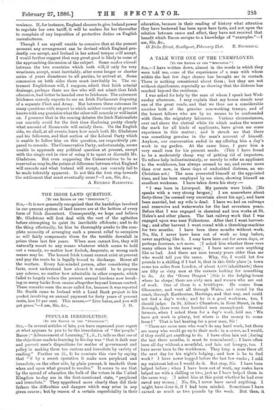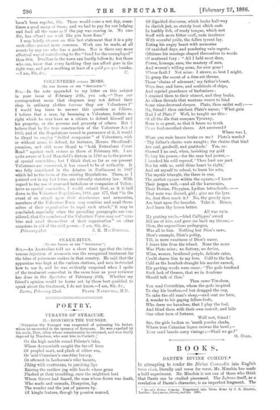A TALK WITH ONE OF THE UNEMPLOYED.
I-TO THE EDITOR OF THE " SPECTATOR."1
SIR,—I have written down, almost in the words in which they were told me, some of the experiences of a man with whom within the last few days chance has brought me in contact. There is nothing sensational about them ; but they are not without significance, especially as showing that the distress has reached beyond the residuum.
I was asked for help by the man of whom I speak last Wed- nesday afternoon. I may explain that my house stands near one of the great roads, and that we thus see a considerable number both of the genuine non-working tramps, and of the honest fellows who are by no means to be confounded with them, the migratory labourers. Various circumstances, over and above the clerical white tie which makes the wearer the mark for all kinds of applicants, have given me some experience in this matter ; and it struck me that there was something genuine in the man's account of himself. Anyhow, our conversation ended in my offering him a day's work in my garden. At the same time, I gave him a very small sum for his present needs. (This I have found to be a moderately cheap way of getting rid of impostors. To refuse help indiscriminately, or merely to refer an applicant to the workhouse, has always seemed to me, and seems more than ever now, in these days of undoubted distress, an uu- Christian act.) The man presented himself at the appointed time, and has been employed by me since, showing himself an excellent workman. I have taken down his story :— "I was born in Liverpool. My parents were Irish. [He speaks with a very strong brogue.] I am somewhere about forty-three [he seemed very uncertain about his age], and have been married, but my wife is dead. I have woi ked on railways and reservoirs and waterworks for the last seventeen years. Before that I was engaged in chemical and iron works at St. Helen's and other places. The last railway work that I was engaged upon was near Folkestone. After that I went harvest- ing; and after harvest I went round with a threshing-machine for two months. I have been three months without work. No, Sir, I never have been out of work so long before, never anything like it. I may have been out for seven days, or perhaps fourteen, not more. [I asked him whether there were many others in the same way.: I have never seen anything like so bad. And there are men twenty years older than me who would tell you the same. Why, Sir, I would bet five pounds to a shilling if I had it, that in this little place [a town some ten miles from London, of about 4,000 inhabitants] there are fifty or sixty men at the corners looking for something to do. At the 'Green Dragon' [this is the lodging-house where he sleeps] there are sixty men and women who are out of work. One of them is a bricklayer. He comes from Gloucester, and went all through Wales, and round by the coast, through Eastbourne, Hastings, and that way, and could not find a day's work ; and he is a good workman, too, I
should judge. In St. Alban's Chambers, in Kent Street, in the Borough, there were four hundred men unemployed. Several farmers, when I asked them for a day's work, told me, We have got work in plenty, but where is the money to come from ? ' That is bad hearing for a poor man, Sir !
'There are some men who won't do any hard work, but there are many who would go up to their necks in a sewer, as I would, if they could get anything to do. I have often lain out [during the last three months, it must be remembered] ; I have often been all day without a mouthful, and lain out hungry, too. I have never been to the workhouse. They keep a man there all the next day for his night's lodging ; and how is he to find work ? I have never begged before the last few weeks ; I sold my waistcoat before I would do it. But stop, Sir. I have been helped before ; when I have been out of work, my mates have helped me with a shilling or two, just as I have helped them in the same way. [I asked him at this point whether he had ever saved any money.] No, Sir, I never have saved anything. I might have done it, if I had been minded. Sometimes I have earned as much as two pounds by the week. But then, it hasn't been regular, Sir. There would come a wet day, some- times a good many of them; and we had to pay for our lodging and food all the same as if the pay was coming in. No one, Sir, has offerel me work like you have done."
I may briefly observe on this last statement that it is a pity such offers are not more common. Work can be made, at all events by any one who has a garden. Nor is there any more effectual way of contributing to the "fund for the unemployed" than this. Dwellers in the town can hardly follow it; but those who can, know that every farthing they can afford goes in the right way, and get something at least of a quid pro quo besides.



































 Previous page
Previous page